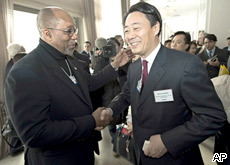I want one, and I’m willing to pay for a data plan. But Softbank will not give it to me.
I have used a Softbank iPhone for a while now — since July 2009, to be precise. Softbank has generally been pretty good to me. When the iPhone 4S came out, they essentially upgraded my iPhone 3GS for free in exchange for a two-year contract extension, and I was happy to take that offer. And their “packet-hodai” deals have been a very cost-effective way to stay in touch while traveling, often coming out cheaper than using hotel wi-fi.
When the new iPad was released last month, and Softbank offered a sweet deal for the 4G model (no money down, and less than 3,000 yen per month for up to 100 MB of data), it seemed like a good time to break down and buy one. I switched job functions a few months ago and now have to do quite a bit of traveling and client presentations, so having a nice big portable Retina display would be more useful than ever.
So I started my online application on the evening of March 18. The application is quite long. I had to input all my information (which Softbank already had) and agree to a few different lengthy form contracts.
Finally they asked for my credit card information, which I duly entered.
“ERROR: The name on your credit card must match the name on your application.”
I knew that my middle name was on my Softbank account, so I had entered my middle name on the first screen of the application. But my credit cards don’t have my middle name. Figuring that was the problem, I canceled the application and re-entered everything without my middle name. This time my credit card was accepted.
Two days later, I received a link to upload a scan of my identification. I started by trying my driver’s license. The upload had to be a JPG, and the scanner at work only produces PDFs, so I scanned a PDF, took a snapshot in Acrobat, and pasted it into Windows Paint.
A few minutes later I got another email. “Your ID has been rejected because it does not match the name on your application.”
Doh! Must be because it has my middle name on it.
Next try. My health insurance card does not have my middle name. Neither does my credit card. And health insurance card plus credit card is listed as an acceptable combination. So I scanned, copied, pasted, saved, and uploaded again.
A few minutes later I got another email. “Your ID has been rejected because it does not match the name on your application.”
I growled, picked up my phone and called customer service. After 15 minutes on hold I finally got to an agent and explained what had happened.
“OK,” she said. “I have your phone number. Can you confirm the name on your account?”
I gave her my name.
“Um,” she said, “that’s not the name on the account.”
I explained that my original account had a middle name on it but that I couldn’t use it while applying through the website. She put me on hold for a few minutes.
“Can you upload ID without your middle name on it?”
“Like I said, I already tried that.”
She put me on hold for a few more minutes.
“So… you tried using ID with your middle name, and then without your middle name?”
“YES,” I said.
She put me on hold for a few more minutes.
“OK, what you need to do is go to a Softbank store and request a change of name…”
I hung up on her and fumed on Facebook. One friend suggested that I complain to Masayoshi Son on Twitter. And I did, which sort of made me feel better. He never replied, though.
At that point I was willing to give up on my iPad dreams, but the deal still seemed too good to pass up. So on Friday, March 24, I walked up the street to the nearest Softbank store and told them I wanted an iPad. The guy at the counter checked my ID, asked for my mobile number, and produced a one-page printed application for me to sign.
“Is everything in this application correct?”
That’s when I noticed that my name was screwed up: the space between my first and middle names was in the wrong place.
“Well… that’s how it was entered in our system. I guess it was probably an error when they set up your account.”
I sighed. “I would have noticed it then. But OK. Can you still process the application?”
“Sure we can.”
“OK. And how long will it take to actually get an iPad?”
“Something like a week, probably. We will call you when it’s ready.”
The next week passed without a call. Yesterday (Monday), I tweeted Softbank customer service asking if there was any way to check the status of the request. They promptly responded that they had no way of checking and that I needed to take it up with the Softbank store.
So I went back to the Softbank store today, gave them my name and asked for a status update. The lady at the counter went into the back for a few minutes and then returned.
“We don’t know what the status is.”
“You have no idea how long it will take?”
“There is a huge backlog. It could easily take a month,” she said. “We request the iPad from Softbank, Softbank requests it from Apple, and there are probably some other steps involved as well.”
Seriously? Is it so hard to take my money and give me a product?
I am tempted to cancel the application and buy a Wi-Fi model at the store, but I know that I will want access to mobile data from time to time. Not enough to warrant a full-blown e-Mobile subscription, though. That’s the most frustrating part of this experience. Why can’t Softbank get its act together?


